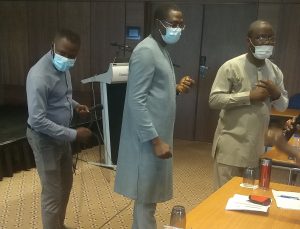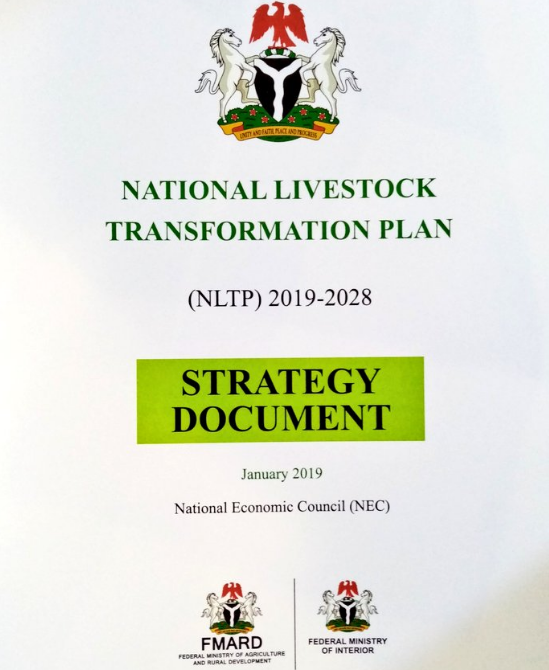All the 19 states that make up the defunct Northern Nigeria have accepted implementing the National Livestock Transformation Plan, (NLTP), Presidential Aide on the NLTP, Dr. Andrew Kwasari has said. Dr. Kwasari told an ‘Experience Sharing and Learning Conference on Farmer and Herder Conflicts in Nigeria’ Thursday in Abuja that there is no alternative to the NLTP because it is the most holistic approach.
 Dr. Kwasari spoke against the background of serious reservations about the health of the society at the same occasion. Dr. Usman Bugaje, a member of the Nigeria Working Group who made a short intervention disagreed indirectly with the presidential aide. Dr. Bugaje who arrived to speak after Kwasari had left said Nigerians are confronting decomposition of society rather than a normal crisis.
Dr. Kwasari spoke against the background of serious reservations about the health of the society at the same occasion. Dr. Usman Bugaje, a member of the Nigeria Working Group who made a short intervention disagreed indirectly with the presidential aide. Dr. Bugaje who arrived to speak after Kwasari had left said Nigerians are confronting decomposition of society rather than a normal crisis.
This, he said, must be the nation’s reality or we would not be able to explain or understand why values have collapsed, why traditional authority has collapsed, why religious authority has collapsed and why the ethical based is not there even though, according to him, human nature is not normally about bread and butter.
Dr. Bugaje wondered what use government is if it is unable to fulfil basic responsibilities, asking what constitutional processes are there by which a government can be compelled to deliver. He decried the huge gap that he says he sees between knowledge and policy in Nigeria, wondering how the PIB Bill, for example, has taken a decade and is yet to become a law. Delivered before Dr. Bugaje took his turn, Dr. Kwasari could not have anticipated Dr. Bugaje.
Admitting though that religious discourses are overshadowing the programme, the aide, however, explained how all the states in the old region have accepted the logic of the programme anyway and implementation is gone well in a number of them. He said there is no alternative to it because no individual states can solve the problem without pushing it to those who might not have bought into it.
Dr. Kwasari was speaking on “The National Livestock Implementation Plan, NLTP: The Journey So Far” at the event put together by the Centre for Democracy and Development, (CDD) in Abuja featuring researchers, implementers, activists and sundry practitioners concerned with healing fissures in the society.

Dr. Kwasari at the occasion
The focus of the NLTP, he told his audience, is using scientific procedures to enable Nigeria put the country’s vast land resources to use, situating the herder-farmers violence in the context of scarcity of land for pastoralists and farmers due to what he calls changing patterns across the country such as desertification or the transformation of rainforests into grasslands; lakes and other water points becoming dry lands and expanding population.
He added to the requirements of NLTP getting Nigeria’s contiguous nieghbours to do the same thing towards a coordinated migration management framework or there could still be problems. He is expressing the hope of success, given, among others the many other actors involved such as international governmental organisations, development partners and international NGOs. Success, for him, is the challenge of feeding a growing population and creating jobs.
The highlight of the experience sharing meeting was a research report on “Farmer-Herder Conflict in Northern Nigeria: Trend, Dynamics and Gender Perspectives”. It was presented by the spokesperson of the team of four that is handling the research, Dr. Nathaniel Danjibo of the Peace and Conflict programme of the University of Ibadan. His presentation of the on-going research attracted inputs from attendees, many of whom observed the top – down nature of the NLTP; the lack of sufficient conscientisation around it, the complicity or the breakdown of the traditional institution in the management of the conflict across the areas studied and the gender problematique in the herder-farmer violence as shown by the data so far from the four focal states of Benue, Nasarawa, Kaduna and Katsina states.
A panel of four, representing the civil society, the media, MACBAN and a Christian community leader took a session with particular reference to the question of what is to be done, (to be separately reported in a coming feature).
Spelling out the essence of the experience sharing exercise, Dr. Chris Kwaja who spoke on that identified what he called specific and strategic recommendations. Alluding to the NLTP as a game changer, Dr. Kwaja explained the masterminds behind the experience sharing wanted a critical review of what has been done previously, based on ‘appreciative inquiry’ approach. The preference, he said, is collaborative problem solving approach in all cases.
Did the organisers get what it expected? One would think so going by the summary of major outcomes read by Shamsudden Yusuf of CDD. The stress on more collaborative work, strengthening of advocacy, rehabililitation of the traditional authority, among others, in the schedule of engagement needed in the management of the conflict points in that direction.
It was now the turn of Wuraola Solomon, CDD researcher who gave the vote of thanks to end the session with kudos for all participants who made it worthwhile.





























1 Comments
ISMAILA BAKER
Comment… we farmers need help of equipment to increase farming in northern side of the country